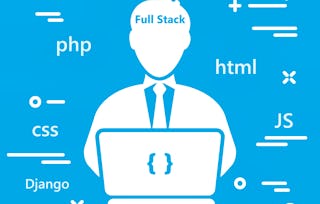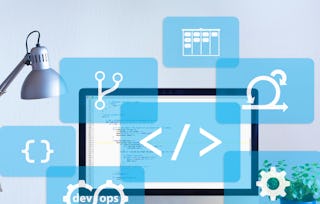This is the final course in the IBM Backend Development Professional Certificate. This capstone project course will give you the chance to practice the work that back-end developers do in real life when working with applications.

Back-end Application Development Capstone Project
Seize the savings! Get 40% off 3 months of Coursera Plus and full access to thousands of courses.

Back-end Application Development Capstone Project
This course is part of IBM Back-End Development Professional Certificate

Instructor: IBM Skills Network Team
6,427 already enrolled
Included with
41 reviews
What you'll learn
Demonstrate proficiency to develop and deploy backend services and applications
Apply your back-end development skills to author microservices and REST APIs in Flask
Create and query databases like MongoDB and integrate with Django apps
Containerize microservices using Docker and deploy using Kubernetes, OpenShift and serverless
Skills you'll gain
Details to know

Add to your LinkedIn profile
11 assignments
See how employees at top companies are mastering in-demand skills

Build your Cloud Computing expertise
- Learn new concepts from industry experts
- Gain a foundational understanding of a subject or tool
- Develop job-relevant skills with hands-on projects
- Earn a shareable career certificate from IBM

There are 5 modules in this course
Earn a career certificate
Add this credential to your LinkedIn profile, resume, or CV. Share it on social media and in your performance review.
Instructor

Offered by
Explore more from Cloud Computing
 Status: Free Trial
Status: Free Trial Status: Free Trial
Status: Free Trial Status: Free Trial
Status: Free Trial Status: Free Trial
Status: Free Trial
Why people choose Coursera for their career

Felipe M.

Jennifer J.

Larry W.

Chaitanya A.
Learner reviews
- 5 stars
95.34%
- 4 stars
4.65%
- 3 stars
0%
- 2 stars
0%
- 1 star
0%
Showing 3 of 41
Reviewed on Mar 13, 2024
I directly applied the concepts and skills I learned from my courses to an exciting new project at work!

Open new doors with Coursera Plus
Unlimited access to 10,000+ world-class courses, hands-on projects, and job-ready certificate programs - all included in your subscription
Advance your career with an online degree
Earn a degree from world-class universities - 100% online
Join over 3,400 global companies that choose Coursera for Business
Upskill your employees to excel in the digital economy

